|
|
|
Sort Order |
|
|
|
Items / Page
|
|
|
|
|
|
|
| Srl | Item |
| 1 |
ID:
117436
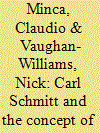

|
|
|
|
|
| Publication |
2012.
|
| Summary/Abstract |
The paper investigates the promise of Carl Schmitt's concept of 'nomos' for developing new spatial imaginaries apposite to the study of 'the border' in contemporary political life, as per the aims of the 'Lines in the Sand' research agenda. Schmitt introduced the idea of a 'nomos of the earth' to refer to the fundamental relation between space and political order. There have been various historical expressions of the nomos, from the Respublica Christiana, to the jus publicum Europaeum, to a post-World War II (dis)order yet to be adequately theorised. We aim to explore the relatively overlooked spatial ontology of Schmitt's work and suggest ways in which it might prompt alternative ways of thinking about borders and bordering practices as representative of broader dynamics in the relation between space and political order.
|
|
|
|
|
|
|
|
|
|
|
|
|
|
|
|
| 2 |
ID:
141278
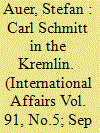

|
|
|
|
|
| Summary/Abstract |
The protracted crisis in Ukraine has exposed fundamental political differences between leaders in western Europe and their counterparts in Russia. The very existence of the European Union was meant to have refuted geopolitics as a useful theoretical lens through which to view power relations in Europe. After all, the European project is based on the idea that boundaries no longer matter and that national sovereignty is obsolete. And yet, geopolitics remains critically important—certainly for Europe's potential enemies, but also for Europe itself. It is poignant that to advance our understanding of this new constellation we are well served to turn to the insights of a classic, if hugely controversial, German political thinker: Carl Schmitt. Schmitt's political philosophy is relevant in three aspects. First, as a source of inspiration—even if only indirectly—for the contemporary Russian political establishment. Second, the behaviour of Putin's Russia, particularly since 2008, can be best understood through some of the key concepts that preoccupied Schmitt: sovereignty, the political and geopolitics. Third, Schmitt's philosophy can serve as a point of departure for reflecting on the possibility of a more robust response by Europe to the Russian intervention in Ukraine. What Europe needs is a more hard-nosed realist approach, which recognizes that Russia's expansionist ambitions can only be constrained by its own readiness and willingness to deploy power both politically and, if necessary, even militarily.
|
|
|
|
|
|
|
|
|
|
|
|
|
|
|
|
| 3 |
ID:
115733
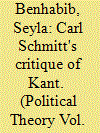

|
|
|
|
|
| Publication |
2012.
|
| Summary/Abstract |
Carl Schmitt's critique of liberalism has gained increasing influence in the last few decades. This article focuses on Schmitt's analysis of international law in The Nomos of the Earth, in order to uncover the reasons for his appeal as a critic not only of liberalism but of American hegemonic aspirations as well. Schmitt saw the international legal order that developed after World War I, and particularly the "criminalization of aggressive war," as a smokescreen to hide U.S. aspirations to world dominance. By focusing on Schmitt's critique of Kant's concept of the "unjust enemy," the article shows the limits of Schmitt's views and concludes that Schmitt, as well as left critics of U.S. hegemony, misconstrue the relation between international law and democratic sovereignty as a model of top-down domination. As conflictual as the relationship between international norms and democratic sovereignty can be at times, this needs to be interpreted as one of mediation and not domination.
|
|
|
|
|
|
|
|
|
|
|
|
|
|
|
|
| 4 |
ID:
110770


|
|
|
|
|
| Publication |
2011.
|
| Summary/Abstract |
This article assesses the extent to which security regimes are the products of authorization in the thought of Thomas Hobbes and Carl Schmitt. The Hobbesian security regime offers a contingent construction of security in terms of processes of authorization and brings into view questions about the epistemic construction of security within security discourse today. The Schmittian concept of security involves the naturalization of security through the state, meaning that security is understood as condition rather than regime. Rather than look to Carl Schmitt's concept of security as the paradigm of international security today, there are clear benefits in returning to the contractual account of security evident in the Hobbesian emphasis on authorization. Security is not the primary value of political community, but the means by which political communities realize their internal goods. Schmitt's security regime is fictive, driven by colourful metaphor and political theology. By returning to classic questions of authorization-how a security regime authorizes itself-International Relations theory can examine the legitimation of security beyond an exclusively state-centric model.
|
|
|
|
|
|
|
|
|
|
|
|
|
|
|
|
| 5 |
ID:
099885
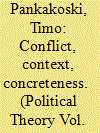

|
|
|
|
|
| Publication |
2010.
|
| Summary/Abstract |
In Reinhart Koselleck's history of concepts, the general orientation that concepts are to be understood in their proper contexts is intertwined with the assumption that they are manifestations of particular political conflicts. The essay shows that the dense compound of context and conflict in Koselleck's thought springs from Carl Schmitt's political theory and also forms an important point of continuity between Koselleck's early work and his later methodological writings. The formalized assumption of conflict, somewhat problematically, binds Koselleckian conceptual history to a particular conception of politics, one that sees politics ultimately as struggle and conflict. Once the historical-theoretical contingency of this conception is recognized, it becomes both possible and necessary to reassess the role of conflict in the methodology of conceptual history.
|
|
|
|
|
|
|
|
|
|
|
|
|
|
|
|
| 6 |
ID:
110912
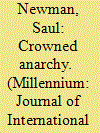

|
|
|
|
|
| Publication |
2012.
|
| Summary/Abstract |
In this article I will explore the paradoxical relationship between anarchism and realism in International Relations (IR) theory. I will do this in an oblique way by uncovering an uncomfortable complicity shared by that existentialist and heretical realist, Carl Schmitt, with his ideological arch-enemies the anarchists. In their diametrically opposed positions on the state, both Schmitt and the anarchists reveal the absolutism of the state in the sovereign moment of exception, and its reliance on a figure of anarchy which at the same time destabilises it, blurring the division between inside and outside and opening up a genuinely revolutionary moment. Here the notion of anarchy is used to deconstruct realism, while at the same time suggesting a move beyond anarchism itself towards a post-foundationalist anarchism or 'postanarchism'. Anarchy reveals the contingency and inconsistency of hegemonic identities in IR, as well as the autonomy of the political which is vital to understanding contemporary movements of resistance to statism and capitalism.
|
|
|
|
|
|
|
|
|
|
|
|
|
|
|
|
| 7 |
ID:
145973
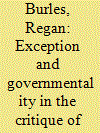

|
|
|
|
|
| Summary/Abstract |
This article investigates the relation between exception and governmentality in the critique of sovereignty. It argues that the problem of sovereignty is not only expressed between the accounts of sovereignty that exception and governmentality articulate, but also within each of those accounts. Taking Michel Foucault and Carl Schmitt as the paradigmatic theorists of governmentality and exception, respectively, this article engages in close readings of the texts in which these concepts are most thoroughly elaborated: Security, Territory, Population and Political Theology. These readings demonstrate that the spatiotemporal expression of the problem of sovereignty within exception and governmentality renders these concepts indistinguishable from one another in terms of their relation to the boundaries of political order. Schmitt and Foucault’s accounts of sovereignty should thus not be read as opposites, but as expressions of the limits of modern political authority. Efforts to develop a critique of sovereignty through typologies of exception or governmentality are bound to reinstantiate the spatiotemporal limits expressed by the principle of state sovereignty.
|
|
|
|
|
|
|
|
|
|
|
|
|
|
|
|
| 8 |
ID:
078485
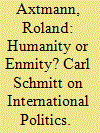

|
|
|
|
|
| Publication |
2007.
|
| Summary/Abstract |
This article reviews Schmitt's analysis of international politics from the period of the Weimar Republic to the early years of the German Federal Republic. It highlights the importance of Schmitt's opposition to Woodrow Wilson's policies and 'liberal' universalism more generally for his understanding of and engagement with international politics. Confronted with the decline of the state (the Ende der Staatlichkeit), Schmitt develops a concept of the political that is not tied in with the existence of the state. Schmitt embraces the fascist stato totalitario as a model for a 'qualitatively' strong state and the distribution of the earth into hegemonic Grossräume as the new nomos
|
|
|
|
|
|
|
|
|
|
|
|
|
|
|
|
| 9 |
ID:
093957
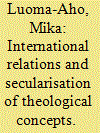

|
|
|
| 10 |
ID:
085417
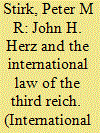

|
|
|
|
|
| Publication |
2008.
|
| Summary/Abstract |
John H. Herz was unusual amongst the founding fathers of international relations in having paid detailed attention to the ideology and international law of the Third Reich in a study published in 1938. This article sets his investigation in the context of the turn away from law in the emerging discipline of international relations and the competing visions of Hans Kelsen and Carl Schmitt. It assesses developments in the international law of the Third Reich during the war years against Herz's own expectation of the emergence of a coherent doctrine, and concludes by suggesting that Herz's defence of international law has much to recommend it.
|
|
|
|
|
|
|
|
|
|
|
|
|
|
|
|
| 11 |
ID:
183900
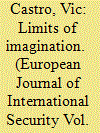

|
|
|
|
|
| Summary/Abstract |
Securitisation theory has too often been associated with the liberal state of exception and its problematic baggage. The Copenhagen School's early claims to deconstruct (not reproduce) the national security logic seem overlooked. Using the fantasy video game World of Warcraft as a large-scale thought experiment, this article asks how a distinct security mode is still possible when the normalisation of armed violence exceeds even what Carl Schmitt's political theory can provide for. Following a careful reading of Ole Wæver's formulation of the ‘existential threat’, securitisation asserts that without a certain referent object, the world becomes meaningless. As a tool for reshaping the limits of imagination, securitisation enacts political communities in World of Warcraft by turning upside down common wisdom about normalcy and security. While normal politics are violently conflictual, securitisation fills in the role of international norms and organisation, fostering supranational cooperation and erasing sovereign disputes. Securitisation thus far exceeds its contingent incarnation in the modern concept of security – a conclusion that has consequences for the normative debate on securitisation and for non-Western interpretations of the theory.
|
|
|
|
|
|
|
|
|
|
|
|
|
|
|
|
| 12 |
ID:
176499
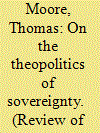

|
|
|
|
|
| Summary/Abstract |
This article considers how we can develop a reflexive reading of the theological contours of global politics through Carl Schmitt's account of sovereignty. In doing this it seeks to generate a critical architecture to understand the pluralistic registers of sovereignty within world politics. This article examines the theological dimensions of sovereignty, calling for a closer reading of the theopolitical discourses of legality and legitimacy at work within the largely secular discipline of International Relations. Tracing the pluralistic dimensions of sovereignty – juristic, popular, and theopolitical – allows us to see how sovereignty is operationalised through a range of distinct political registers. When the study of sovereignty is confused with questions of preference for modes of governing (whether secular, religious, democratic, and/or juristic) the complex historical sociology of sovereignty is overlooked. Contemporary scholarship in International Relations can benefit from closer engagement with the multiple, overlapping registers of sovereignty in global politics. We may disagree with Schmitt's reading of sovereignty as ‘theopolitics’ but there is real methodological value in engaging secular scholarship in thinking about religion as a constitutive domain for global order – alongside a rich range of critical approaches.
|
|
|
|
|
|
|
|
|
|
|
|
|
|
|
|
| 13 |
ID:
155164
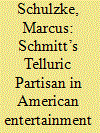

|
|
|
|
|
| Summary/Abstract |
This article explores the political significance of the narratives of partisan warfare that appear in American popular culture. I draw on Carl Schmitt’s concept of the ‘telluric partisan’ – a figure that fights outside the normative boundaries of conventional war in defence of a homeland and the traditional identities that are rooted in it. These fantasies provide a sense of moral clarity, promote national unity, characterise enemy aggression, and glorify traditional values. They establish a ready-made narrative that can be invoked to frame conflicts in terms of the heroic defence of an innocent and victimised people protecting themselves against foreigners and their dangerous ideologies. As I show, this call for popular engagement in war generally serves a conservative project of directing potentially revolutionary expressions of populism and vigilante justice into defence of family and the territorial status quo.
|
|
|
|
|
|
|
|
|
|
|
|
|
|
|
|
| 14 |
ID:
154943
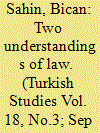

|
|
|
|
|
| Summary/Abstract |
The purpose of this article is to explore the consequences of following two different understandings of law for the consolidation of rule of law and democracy, provided by Friedrich von Hayek and Carl Schmitt. The context within which this exploration is carried out is the political scene of Turkey since December 2013. It is first argued that while the Hayekian understanding of law strengthens the principle of rule of law and democracy, the Schmittian understanding undermines them. Secondly, it is argued that Justice and Development Party government in Turkey has followed the Schmittian understanding of law at least since December 2013 and this in turn has undermined the rule of law and democracy in Turkey.
|
|
|
|
|
|
|
|
|
|
|
|
|
|
|
|
| 15 |
ID:
089525
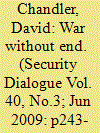

|
|
|
|
|
| Publication |
2009.
|
| Summary/Abstract |
This article seeks to explain the limits of critical discourses of `global war' and biopolitical framings of `global conflict' that have arisen in response to the globalization of security discourses in the post-Cold War era. The central theoretical insight offered is that `global war' should not be understood in the framework of contested struggles to reproduce and extend the power of regulatory control. `Global war' appears `unlimited' and unconstrained precisely because it lacks the instrumental, strategic framework of `war' understood as a political-military technique. For this reason, critical analytical framings of global conflict, which tend to rely on the `scaling up' of Michel Foucault's critique of biopolitics and upon Carl Schmitt's critique of universal claims to protect the `human', elide the specificity of the international today. Today's `wars of choice', fought under the banner of the `values' of humanitarian intervention or the `global war on terror', are distinguished precisely by the fact that they cannot be grasped as strategically framed political conflicts
|
|
|
|
|
|
|
|
|
|
|
|
|
|
|
|
|
|
|
|
|